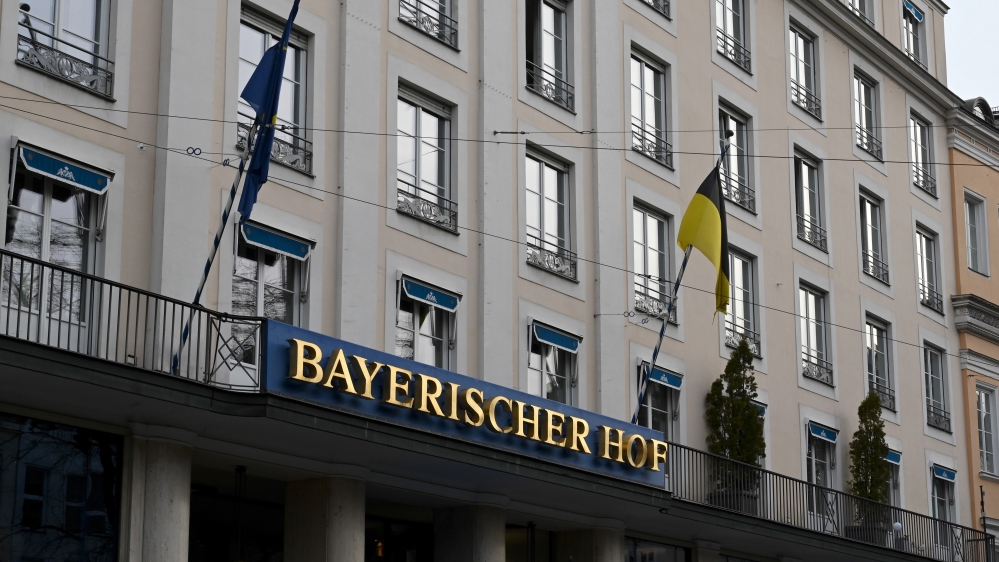What to expect from the Munich Security Conference?
‘Westlessness’ to be discussed against backdrop of Middle East conflicts, coronavirus woes and Kashmir crackdown.

Berlin, Germany – The wars in Libya and Yemen, brewing tensions elsewhere in the Middle East and India’s lockdown of Kashmir are among the most pressing geopolitical concerns as world leaders and diplomats prepare to rub shoulders at the Munich Security Conference, often regarded as the Davos of security and foreign policy issues.
Thirty-five heads of state are among more than 500 politicians, officials and spies scheduled to attend the three-day summit, which begins on Friday and ends Sunday.
Keep reading
list of 3 itemsWhy peace initiatives in Libya are failing
Why did European Parliament delay a vote on India’s CAA, Kashmir?
US Secretary of State Mike Pompeo, French President Emmanuel Macron, NATO Secretary-General Jens Stoltenberg, Ukrainian President Volodymyr Zelenskyy, and the foreign ministers of Russia, Iran and India are all expected.
This year’s theme of “westlessness”, organisers say, points to continued unease about the identity and purpose of the West.
It reflects a growing schism in transatlantic relations and the post-war order, as Donald Trump’s presidency pushes the United States further from Europe.
Common security in Europe is also a growing issue; the continent itself is fractured following Brexit and amid the growth of nationalist and illiberal movements.
Verging on the existential, conference organisers have urged attendees to consider if the world, and the West itself is “becoming less Western”, and how global security will be shaped if Western powers fade in relevance and influence.
“For the past decades, the answer to the question what it was that kept the West together was straightforward: a commitment to liberal democracy and human rights, to a market-based economy, and to international cooperation in international institutions,” read this year’s Munich Security Report, which was published before the conference.
“Today, the meaning of the West is increasingly contested again.”
Platform for searing speeches
The Munich Security Conference was established in 1963 by Ewald-Heinrich von Kleist-Schmenzin, a former German army officer who participated in a failed attempt to assassinate Adolf Hitler, with the aim of gathering leaders and diplomatic experts to discuss the state of NATO and relations between powers on either side of the Atlantic.
Over the decades, the annual meeting has grown to include global security concerns, with Munich’s grand Bayerisch Hof hotel becoming a stage for searing political speeches.
In 2007 in Munich, Russian President Vladimir Putin excoriated the US for “overstepping its borders in all spheres”.
Last year, German Chancellor Angela Merkel clashed with US Vice President Mike Pence over the Iran nuclear deal, rejecting US pressure for Europe to pull out of the agreement and arguing that it provided the best path to maintaining influence over the Islamic Republic.
Merkel will not attend this year, with Foreign Minister Heiko Mass instead representing Germany, which may seek to build on its role as a facilitator in Libya’s shaky peace process.
The conference is usually a backdrop for heated clashes over narratives rather than provide a forum to actually solve security issues.
In January, a major summit in Berlin brought all foreign backers to the conflict together for the first time.
“I would expect discussion around Libya, maybe with the EU and the EU representative taking a role there,” Sarah Bressan, a research associate at the Global Public Policy Institute, told Al Jazeera.
Germany will try to continue these efforts “now that it has a seat at the table after the Berlin conference, to get parties to actually respect the arms the UN arms embargo, which has already been breached”, she added.
Iran is also likely to be a focal point once again following the US assassination of Iranian military commander Qassem Soleimani in Baghdad in January, which sparked international outrage and risked a major military confrontation.
“The US-Iran crisis will be very much an agenda-setter as Munich provides a platform for both the Iranians and anti-Iran hawks from the US and Israel to make their voices heard,” Andreas Krieg, assistant professor at King’s College London, told Al Jazeera.
“For the most part though, the conference is usually a backdrop for heated clashes over narratives rather than provide a forum to actually solve security issues.
“So nobody expects that the US and Iran will actually use the conference to open backchannels.”
Despite several face-to-face meetings between Trump and North Korean leader Kim Jong Un last year aimed at cooling tensions, Pyongyang has continued to develop its ballistic and nuclear weapon programmes, which will be a top priority for South Korean Foreign Minister Kang Kyung-wha, who travels to Munich this weekend.
North Korea conducted several long-range missile tests in December, as Kim threatened the US with a “Christmas surprise” unless progress was made on relieving sanctions.

Organisers announced in late January that the North would send a delegate to Munich for the first time, Vice Foreign Minister Kim Son-gyong.
But South Korean media have reported that his attendance was cancelled due to prevention measures related to the coronavirus outbreak.
In anticipation of the weekend’s discussions, the conference report highlighted Russia’s widening influence in the Middle East, Africa and South America, as well as increased links in trade and military hardware with Beijing.
The document also noted China’s military assertiveness in the South China Sea and its growing superiority in emerging technologies such as artificial intelligence, quantum computing and 5G networks – all signs that the balance of global power is gradually tilting away from Western powers.
“There is a realisation that in the 21st-century world, the West is just one of many poles to shape the global security environment,” said Krieg.